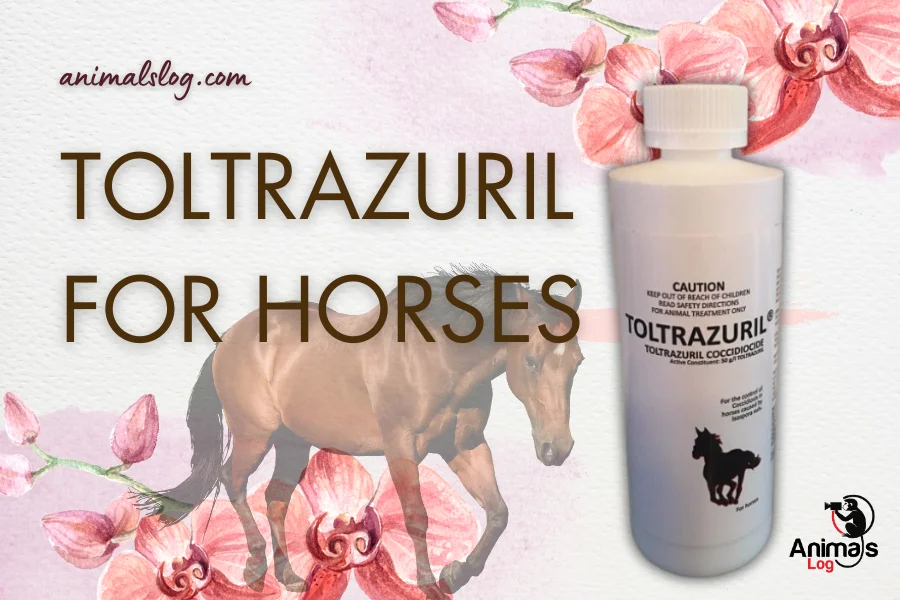Toltrazuril for horses is a very efficient anticoccidial medication that is a member of the triazine class. It functions by preventing the development and propagation of the Eimeria parasites, which are responsible for a number of diseases, including coccidiosis and Equine Protozoal Myeloencephalitis (EPM).
No products found.
Equine Protozoal Myeloencephalitis (EPM)
Equine Protozoal Myeloencephalitis (EPM) in horses is brought on by protozoan parasites like Sarcocystis neurona and Neospora hughesi that may affect horses’ central nervous systems (CNS). Different neurological signs brought on by EPM might be difficult to detect and properly treat.
Symptoms
Given the location and extent of the CNS injury, EPM may express itself in a variety of ways.
- Lack of Strength, lack of coordination, tripping, and irregular gait are symptoms of asymmetrical ataxia.
- Muscle atrophy is the loss of certain muscles, often in the thighs.
- Deficiencies in the cranial nerves cause facial paralysis, problems with swallowing, and irregularities in the eyes.
- Additional symptoms include altered behavior, despair, loss of weight, and issues with equilibrium.
Treatment
- Antiprotozoal medicines including toltrazuril for equine coccidiosis treatment, ponazuril, diclazuril, and sulfadiazine/trimethoprim mixtures, may be employed to treat protozoan parasites.
- Assistance for the horse includes rehabilitation, massage, and dietary assistance.
- Vitamins and drugs that boost the immune system.
- Controlling stress levels, keeping clean water and nutrition sources, and limiting contact with opossums are some management techniques.
Coccidiosis In Horses
Coccidiosis is a typical parasite ailment that affects many animal species, including horses. It is brought on by parasitic protozoans of the genus Eimeria. Horses’ stomachs can get infected with coccidian, which can result in a variety of clinical signs and health problems.
Symptoms
- One of the defining signs of coccidiosis in horses is diarrhea, which is frequently accompanied by mucous or blood.
- Loss of appetite and decreased nutrition absorption as a result of intestinal injury.
- Coccidiosis can cause low energy and generalized health issues.
- Extreme instances may lead to fatigue and weakness.
Treatment
- Toltrazuril is a very efficient drug frequently used for the treatment of equine coccidiosis.
- Make sure that the barns, nutrition, and water supply are clean and sanitary to reduce exposure to polluted settings.
- Effective management practices assist in strengthening the horse’s immune system, including regular vaccinations, a wholesome diet, and upholding a relaxed atmosphere.
What Is Toltrazuril For Horses?
Toltrazuril is a drug that is frequently prescribed to horses to alleviate and avoid coccidiosis and EPM because of the effectiveness of toltrazuril against horse parasites. Horses’ intestines can get infected with coccidiosis, a parasitic ailment brought on by several kinds of Eimeria parasites.
Toltrazuril is an anticoccidial medication that belongs to the triazine family and has been shown to be quite efficient against these parasites. A wide variety of Eimeria species that frequently infect horses can be successfully treated with Toltrazuril.
Coccidiosis is a common parasite illness that can harm young horses and can be effectively managed with toltrazuril treatment for weanling foals. Because they are still establishing their immune systems and may be exposed to polluted settings throughout the weaning process, weanling foals are particularly prone to coccidiosis.
Administration Of Toltrazuril For Horses

It has been demonstrated to concentrate on both asexual and reproductive phases of the parasites’ growth, enabling complete parasite suppression. Typically used as toltrazuril oral suspension for horses, toltrazuril is straightforward and simple to administer.
A dosage syringe can be used to provide the medication straight into the horse’s mouth, or it can be combined with the meal to be consumed. To ensure optimum efficiency and administering toltrazuril to foals safely, it is crucial to adhere to your veterinarian’s prescribed Toltrazuril dosage guidelines for adult horses (typically 20mg/kg).
When taken as prescribed by a veterinarian, the dosage of toltrazuril for horses has an overall favorable safety record. Although negative reactions or side effects are uncommon, sensitivity issues might arise. Toltrazuril must be administered after consulting with your veterinarian to determine its safety and suitability for your particular horse.
Toltrazuril As A Preventive Measure For Coccidiosis
Toltrazuril mainly impacts parasites by preventing the development of their cell walls. The medication precisely targets dihydrofolate reductase, an enzyme required for the parasites’ proliferation and DNA synthesis. Toltrazuril interferes with the typical development and growth of the Eimeria parasites by blocking dihydrofolate reductase.
It hinders the development of new parasite cells and their capacity to proliferate and replicate. Toltrazuril decreases the total population of Eimeria parasites in the horse’s stomach by preventing their development and reproduction. The horse’s defenses may regain equilibrium and resume normal digestive function thanks to this decrease in parasite burden.
Consulting Veterinarian
It is crucial to consult your veterinarian while using toltrazuril to manage and avert coccidiosis. Depending on the severity, they will be likely to precisely identify the existence of coccidiosis or EPM, choose the right dosage and length of therapy, and keep track of the horse’s reaction to it.
To guarantee the efficacy of the therapy, routine checkups and further fecal exams may be required. It is essential to remember that Toltrazuril for horses should only be administered with a veterinarian’s approval, who might suggest using toltrazuril in combination with other dewormers.
As stated earlier, a vet is capable of making a precise diagnosis of coccidiosis or EPM, choosing the right dosage and length of therapy according to the condition’s severity, and keeping track of the horse’s reaction to the medicine. Horse owners may appreciate Toltrazuril’s efficiency in preventing Eimeria parasites and enhancing their horses’ overall well-being when they are aware of how it functions.
Side Effects Of Toltrazuril In Equines
- Some horses may develop a slight stomach disturbance, which might manifest as brief pain or mild colic. By taking the medicine with food or according to the veterinarian’s feeding recommendations, this can be reduced.
- Although uncommon, Toltrazuril hypersensitivity in horses might result in allergic symptoms, including hives, itching, or swelling.
- Localized swelling or irritation at the injection site may occasionally happen when Toltrazuril is delivered in an injectable formulation rather than the typical oral suspension.
- Toltrazuril is used to treat coccidiosis-related diarrhea, although, in rare instances, it may make symptoms worse if another condition is the primary underlying cause.
- Some horses may temporarily lose their appetite while receiving toltrazuril treatment or soon after. Providing access to clean water and nutritious food can promote eating.
FAQs on Toltrazuril for Horses
How much does toltrazuril for horses cost?
A 200 milligrams bottle of toltrazuril for horses may cost up to $100.
What is the optimum dosage of toltrazuril for horses?
The optimum dosage of toltrazuril for horses is 10 to 30 milligrams per kg of body mass. Dosage should be administered daily for about 3 to 5 days to fully prevent coccidiosis in horses.
What is another name for toltrazuril?
Toltrazuril may also be traded under the name of Baycox or Tolcox.
Final Thoughts
Toltrazuril for horses is a simple and extremely successful treatment option for horses suffering from coccidiosis or EPM. It is a dependable option for eradicating Eimeria parasites due to its wide-ranging effectiveness, simplicity of administration, and favorable safety record. Remember that a proper diagnosis of coccidiosis, the right dosage, and tracking the horse’s development all through treatment require consultation with a vet.







